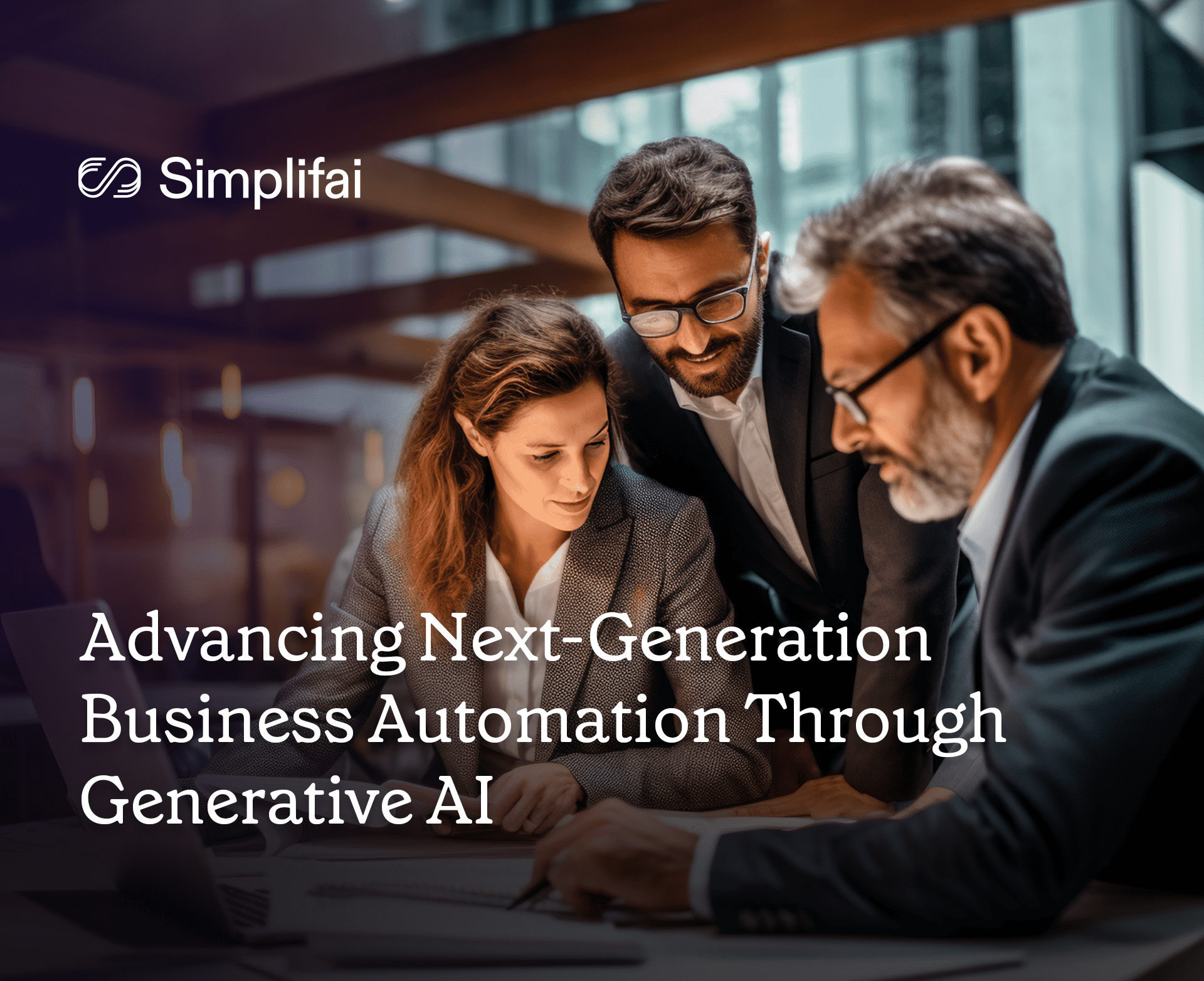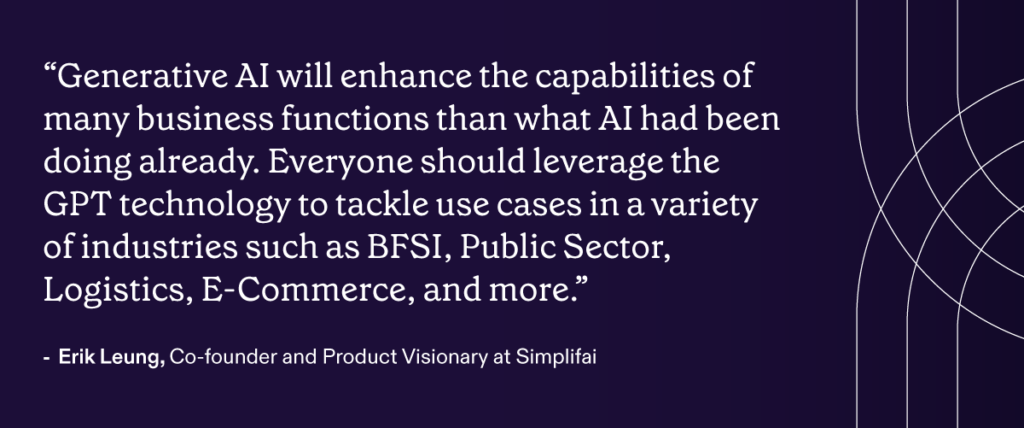Advancing Next-Generation Business Automation Through Generative AI
The Transformative Influence of Generative AI in the Banking, Financial Services, and Insurance Sector.

The Unveiled Potential of Generative AI: Bridging Vision and Reality
Envision an era where your business communication operations are empowered by intelligent systems that not only manage but also anticipate and adapt to customer needs with unparalleled precision and personalization. This scenario is not a glimpse into a far-off future, but the current reality offered by the potential of Generative AI.
This technology, powered by advanced business automation solutions utilizing Large Language Models (LLMs) such as GPT-4, BERT (Bidirectional Encoder Representations from Transformers), ELECTRA (Efficiently Learning an Encoder that Classifies Token Replacements Accurately), and RoBERTa (Robustly Optimized BERT Pretraining Approach), is revolutionizing the way we perceive customer interaction and service delivery.

Generative AI applications, especially those driven by GPT and similar LLMs, are rapidly becoming a transformative force across various sectors, notably within the BFSI (Banking, Financial Services, and Insurance) industry, which is traditionally overwhelmed by the volume and complexity of customer communication.
A New Frontier of AI Technologies for the BFSI Sector
To fully appreciate the impact of Generative AI within the BFSI sector, it is essential to comprehend the functionalities and implications of technologies such as GPT and LLMs.
Generative Pre-trained Transformers (GPT) and other LLMs is a type of Artificial Intelligence that have the capability to produce unique, original outputs, unlike traditional AI that relies on fixed datasets. Whereas LLM is an umbrella term that includes AI such as GPT based on Generative AI.
LLMs help generative AI systems to give new results and original content as compared to traditional AI models that are trained on existing data sets to give predictable results. Basically, LLMs are algorithms that can continuously learn based on dynamic, massive feeds of text-based data sets [2].
They can identify, predict, translate, summarize, and generate appropriate responses across a myriad of formats, from text to images and sounds. This characteristic is particularly advantageous in an industry that is constantly seeking innovative ways to enhance efficiency, customer satisfaction, and overall business growth.

Navigating Challenges in the BFSI Industry with Generative AI
The BFSI sector is often at the forefront of technological adoption, driven by the necessity to manage an ever-increasing volume of customer interactions and communications efficiently. This sector is no stranger to the surge in written communications – and these further bring a horde of challenges in the long run that affect operational efficiency. Customers today want quick and instant replies to their inquiries, and no longer want to wait for days at end to get an answer to their cases.
Moreover, the BFSI industry is prone to a surge in work volumes during peak seasons, especially when communications occur through emails and documents. the Turnaround Time (TAT) increases, and work begins to pile up. Even for large customer service and back-office teams, it might be overwhelming to handle every customer case with equal attention and efficiency.

Furthermore, traditional methods, reliant on manual processes and basic automation, struggle to meet the growing demand for rapid and accurate responses, leading to potential customer dissatisfaction and operational bottlenecks.
Generative AI, with its inherent capability to automate and innovate, presents a viable solution to these challenges, offering a pathway from manual to AI-enhanced communications and operations.
From Manual Efforts to AI-Enhanced Communications
The shift towards Generative AI, particularly through LLM technologies like GPT, is evidenced by its ability to automate routine yet critical tasks such as email and document processing. Research indicates with access to LLM, about 15% of worker tasks in the US could be completed significantly faster, which could further reach 56% by incorporating conventional tools and software. [3]

By generating human-like text, Generative AI transforms volumes of written communications into seamless, engaging interactions, enabling businesses to streamline their processes, focus on strategic initiatives, and significantly improve the customer experience.
Exploring the Vast Potential of Generative AI in the BFSI Sector
The application of Generative AI and LLMs within the BFSI industry is extensive, touching on various aspects:
- Customer support and communication – LLMs can be used to develop virtual assistants capable of understanding and responding to customer queries, providing support, and offering personalized recommendations.
- Document generation and review – LLMs can automate the process of generating and reviewing various documents, such as contracts, agreements, and reports. By providing relevant input data, the models can generate accurate and customized documents, saving time and reducing manual effort.
- Intelligent Contract Analysis – LLMs can automate the analysis of complex legal and financial contracts. They can extract key information, identify clauses, and flag potential risks or non-compliance issues. This automation streamlines contract review processes, reduces manual effort, and ensures consistency and accuracy in contract analysis.
- Personalized Financial Recommendations – By analyzing customer data, including financial history, spending patterns, and risk appetite, LLMs can generate personalized financial recommendations. This can help financial institutions offer tailored investment plans, loan options, and insurance products to their customers.
- Automation of Routine Tasks – LLMs can automate repetitive and time-consuming tasks, such as data entry, data cleansing, and report generation. This allows employees to focus on more complex and value-added activities, improving overall operational efficiency.
Realizing Business Value: The Tangible Benefits of Generative AI
The integration of Generative AI into BFSI operations brings forth significant advantages, including improved operational efficiency, cost reductions, and enhanced customer satisfaction. It empowers BFSI businesses to handle a surge in customer queries, reduces the scope of human error, and delivers highly personalized and precise responses.
These are some of the business values derived from Generative AI automation solutions:
- Enhanced business prospects and augmented Return on Investment (ROI).
- Decreased response times for tasks related to customer service, enhancing operational responsiveness.
- Effective management and resolution of a growing volume of customer inquiries, ensuring scalability.
- Acquisition of a competitive edge during high-demand periods through expanded operational capacity.
- Minimization of manual inaccuracies, leading to enhanced precision and operational efficiency.
- Elevated levels of customer satisfaction achieved through continuous, 24/7 service availability.
Envisioning a Future Shaped by Generative AI
As the BFSI sector grapples with the challenges of catering to a diverse and evolving customer base, the limitations of traditional automation become increasingly apparent. In this context, Generative AI, powered by LLMs like GPT, emerges as a pivotal solution, offering the ability to generate unique, tailored responses to a wide array of tasks and inquiries. This marks the dawn of an era where AI not only assists but significantly leads in the transformation of customer service and business growth strategies within the BFSI industry. Hence it is evident that Generative AI stands as a cornerstone of the future, redefining the boundaries of what is possible in business automation and customer interaction.
Sources:
[1] https://marketresearch.biz/report/generative-ai-in-financial-services-market/#:~:text=Report%20Overview,period%20from%202023%20to%202032.
[2] https://www.linkedin.com/pulse/large-language-models-llm-immediate-future-reinhold-quillen/
[3] https://arxiv.org/abs/2303.10130
[4] https://www.grandviewresearch.com/industry-analysis/generative-ai-market-report


